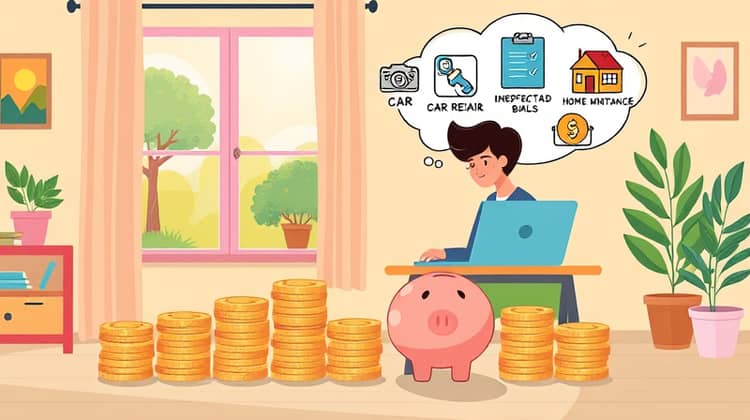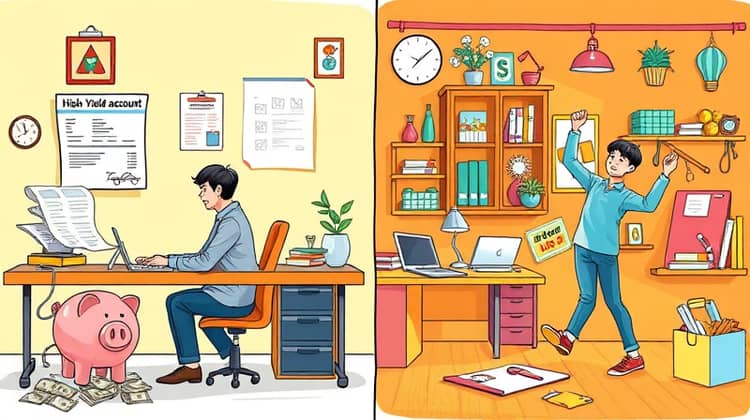Boost Your Emergency Fund Fast: The Power of Side Gigs

In today's fast-paced world, financial security has never been more important. One of the best ways to achieve this security is by building an emergency fund. However, saving money can sometimes feel overwhelming, especially when expenses seem to rise continuously. Fortunately, there is a way to boost your savings quickly: side gigs. In this article, we'll explore how side gigs can help you save for your emergency fund and why they're an essential part of your financial strategy.
An emergency fund acts as a safety net, providing financial security in times of crisis, such as unexpected medical bills, car repairs, or job loss. By utilizing side gigs, you can increase your income and accelerate the growth of your emergency fund.
Why an Emergency Fund is Essential

Everyone experiences unexpected expenses at some point in their life. These financial surprises can derail your carefully planned budget, potentially leading to debt or financial stress. That's why having an emergency fund is crucial; it allows you to cover these costs without jeopardizing your financial stability.
An emergency fund is not just a buffer against unexpected expenses but also a source of peace of mind. Knowing that you have money set aside to cover emergencies can make a significant difference in how you manage your finances and the stress you experience in day-to-day life.
- Provides a safety net against financial emergencies.
- Helps you avoid high-interest debt during unexpected situations.
- Offers peace of mind and reduces financial stress.
- Encourages better money management habits.
Building an emergency fund should be a priority for everyone, and utilizing side gigs can significantly speed up the process. In the next section, we will examine the rising cost of living and how it impacts the necessity for such funds.
The Rising Cost of Living

Every year, the cost of living in many areas continues to climb. Prices for essential goods and services, such as rent, groceries, and healthcare, are rising at a pace that often outstrips wage growth. This reality highlights the importance of having a robust emergency fund.
As life becomes more expensive, the financial cushion provided by an emergency fund is more necessary than ever. Without adequate savings, unexpected expenses can lead to panic and immediate financial distress, underscoring the need for a substantial emergency fund. If you don't have a financial safety net, tempting options like credit cards and loans might be your only recourse during tough times. This could mean accumulating debt rather than solving your problems.
Traditional Saving Methods vs. Side Gigs

Traditional saving methods often involve setting aside a portion of your earnings in a high-yield savings account. However, progress is typically slow, and regular savings may not keep up with the financial demands of everyday life.
Many individuals find that relying solely on traditional saving methods can limit their ability to build an emergency fund quickly. Side gigs present an alternative approach, enabling you to earn extra income that can be directed specifically towards savings.
Traditional Saving Methods
While traditional savings strategies have their merits, such as the safety and security of bank accounts, they can sometimes feel inadequate in building a meaningful emergency fund. It takes time and discipline to watch your savings grow enough to make a difference in your finances.
Furthermore, the interest rates on most savings accounts are often too low to counteract inflation. This means that, while you may be saving, the value of your money could be diminishing over time.
- Open a high-yield savings account.
- Set up automatic transfers to your savings.
- Track your expenses to identify saving opportunities.
- Limit discretionary spending to increase monthly savings.
Although traditional methods are essential, they may not be sufficient on their own, especially in today's economic climate. The next section will explore how engaging in side gigs can help to boost your emergency fund even faster.
Side Gigs
Side gigs allow individuals to increase their income significantly and provide a flexible way to save more for an emergency fund. With various opportunities available today, there’s something to suit everyone’s skills and schedules.
What makes side gigs particularly appealing is their potential for higher earnings compared to traditional savings methods. You can choose how much time and effort you want to dedicate, making them a versatile option for many.
- Freelancing in your area of expertise.
- Participating in the gig economy via apps like Uber or TaskRabbit.
- Selling handmade items or crafts online.
- Offering online tutoring or coaching in your niche.
Side gigs can not only help you withdraw cash quickly but also enable you to pursue passions and build skills outside your regular job. The cumulative effects can lead to greater financial stability and growth in your emergency fund. In the next section, we’ll discuss how to choose the right side gig suited for you.
However, alongside financial stability, engaging in side gigs might also present challenges in terms of time management and balancing work. It’s crucial to choose a side gig that you enjoy and can commit to without overwhelming your schedule.
How to Choose the Right Side Gig

When considering a side gig, it's essential to think about your skills, interests, and available time. Choosing something you enjoy will make the work less of a burden and more rewarding. Start by examining your professional experience and personal hobbies to discover opportunities that align with them.
Another critical factor is the potential income of the side gig. Different opportunities can yield varying financial rewards, so do your research to find out which gigs are most profitable and suitable for your situation.
- Identify your skills and interests.
- Research potential income levels for different side gigs.
- Consider your available time and commitment level.
- Evaluate flexibility and ease of scheduling for your choice.
With careful consideration, you can find a side gig that fits seamlessly into your life and helps you build your emergency fund faster than traditional methods alone. Next, we will provide tips for balancing a side gig with your full-time job.
Tips for Balancing a Side Gig and Full-Time Job

Balancing a side gig with a full-time job requires effective time management and prioritization. It’s essential to be organized and keep track of your responsibilities to prevent any overlaps or conflicts between your commitments.
- Set a consistent schedule for your side gig.
- Communicate with your employer if necessary about your side gig.
- Use productivity tools to manage your time effectively.
- Stay focused on your goals to avoid burnout.
Finding the right balance is crucial to avoid overwhelming yourself, which could ultimately lead to burnout and a decline in performance at your primary job. By ensuring you keep your health and well-being in check, you can succeed in both areas of your life.
Tracking Your Progress

Tracking your progress is vital to maintaining motivation and ensuring that your emergency fund grows. With the help of apps or a simple spreadsheet, monitoring both your side gig earnings and savings can be straightforward and effective.
Setting a clear savings goal will help you stay focused on how much you want to save and by when. Regularly reviewing your progress can give you a sense of achievement and encourage you to continue working towards that goal.
Conclusion

In today's fast-paced economic environment, building an emergency fund is more important than ever. Traditional saving methods alone may not suffice, especially with the rising cost of living and unexpected expenses that life throws at us.
Engaging in side gigs not only boosts your income, giving you the ability to save faster but also can lead to personal growth and new experiences. By being strategic in selecting your side work and managing your time effectively, you can build a robust emergency fund that gives you peace of mind now and in the future.






